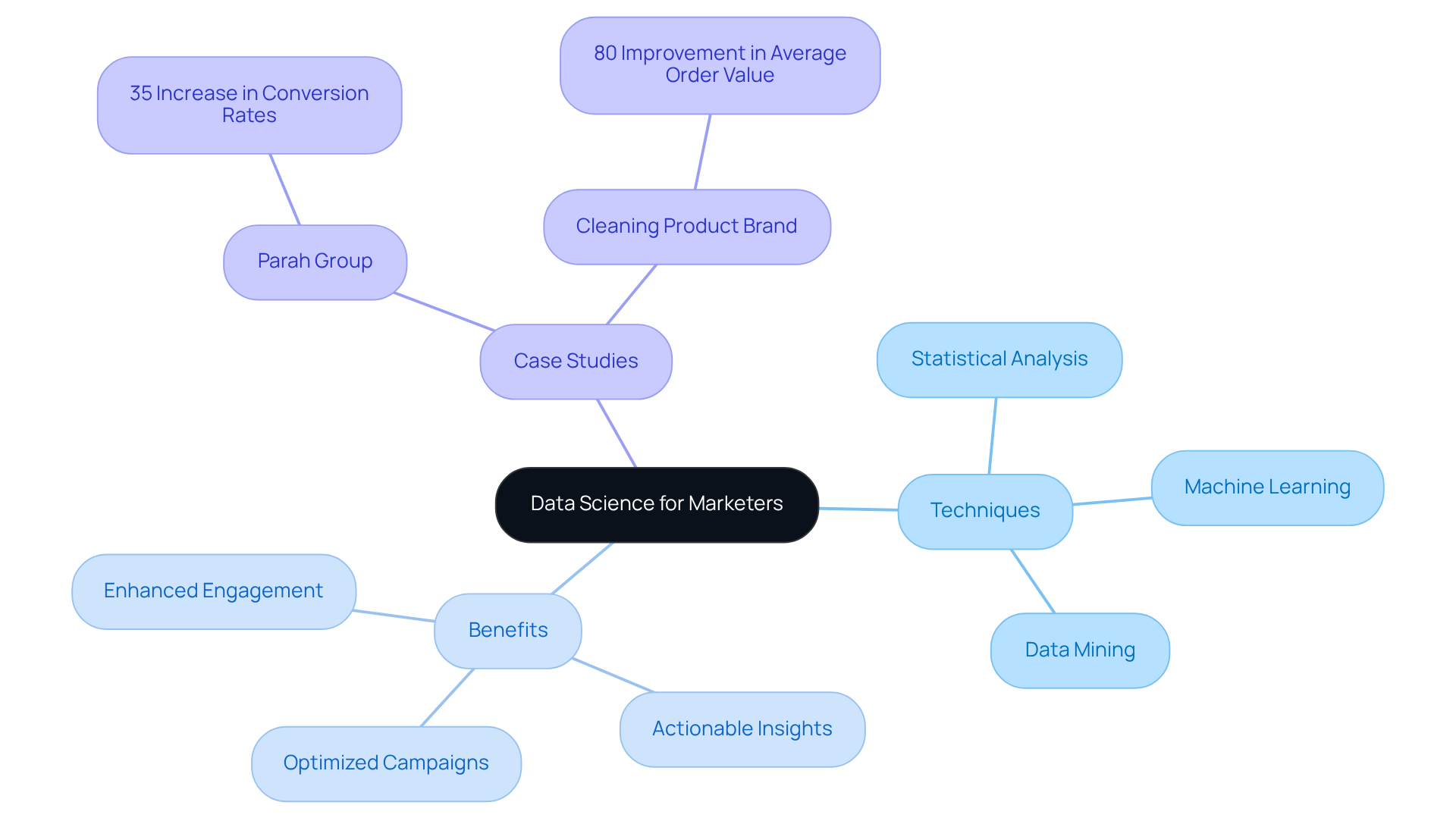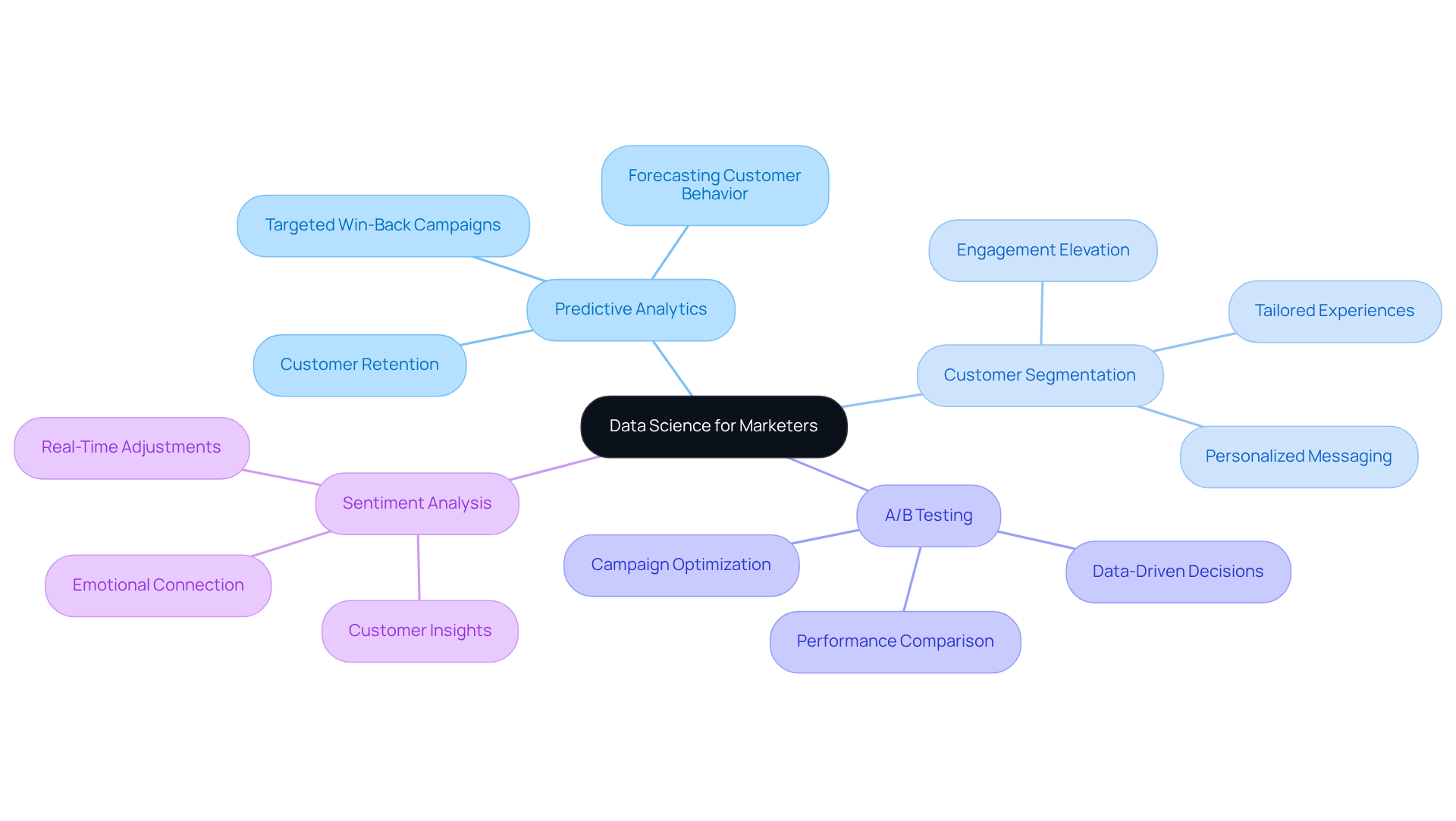
Overview
Data science for marketers is indispensable for DTC brands, leveraging statistical analysis and machine learning to extract actionable insights that enhance marketing strategies and elevate customer engagement. This necessity is underscored by examples of DTC companies that have adeptly increased conversion rates and average order values through data-driven methodologies. These instances highlight the pivotal role of analytics in optimizing promotional effectiveness and nurturing customer relationships.
By integrating data science into their marketing frameworks, brands not only refine their approaches but also foster deeper connections with their audience. The evidence is clear: analytics is not merely a tool; it is a critical component in the arsenal of successful marketing strategies. In an era where consumer behavior is increasingly data-driven, brands that harness these insights position themselves ahead of the competition.
In conclusion, embracing data science is not just beneficial; it is essential for DTC brands aiming to thrive in a competitive landscape. Marketers must prioritize the integration of analytical insights into their strategies to drive meaningful engagement and achieve sustained growth.
Introduction
The landscape of marketing is undergoing a profound transformation, driven by the power of data science. For direct-to-consumer (DTC) brands, harnessing statistical analysis and machine learning techniques is not merely a competitive advantage; it is essential for survival in an increasingly data-driven marketplace. This article delves into the pivotal role of data science in marketing, exploring how it empowers brands to decode consumer behavior and optimize strategies for enhanced engagement and conversion rates. As the demand for data proficiency grows, brands must effectively bridge the skills gap and leverage these insights to foster sustainable growth.
Define Data Science for Marketers
A strategic approach known as data science for marketers utilizes statistical analysis, machine learning, and mining techniques to derive actionable insights from marketing-related information. This critical process involves the gathering, handling, and examination of data to guide promotional strategies, optimize campaigns, and . For direct-to-consumer (DTC) companies, analytics plays an indispensable role; it empowers marketers to interpret consumer behavior, anticipate trends, and make informed decisions that significantly boost conversion rates and customer satisfaction.
As we look toward 2025, the importance of data science for marketers in DTC marketing will only intensify, as companies increasingly rely on data-driven insights to navigate competitive landscapes. Numerous successful examples illustrate this trend, such as Parah Group's collaboration with a $30 million clothing line, which saw a remarkable 35% increase in conversion rates following the implementation of strategies like homepage redesigns to emphasize social proof and optimized product pricing. Similarly, a $15 million cleaning product brand achieved an 80% improvement in average order value (AOV) through strategic bundling and price testing. These case studies underscore the tangible benefits of data-informed approaches, highlighting how data science for marketers enables companies to generally realize a 10-15% revenue increase from personalization initiatives.
Furthermore, 91% of organizations report quantifiable value from their investments in information and analytics, underscoring the effectiveness of these strategies. As the analytics landscape evolves, DTC companies that harness the power of analytics will not only enhance their promotional effectiveness but also foster stronger relationships with their customers, ultimately paving the way for sustainable growth and profitability. However, the notable skills gap in analytics presents a significant challenge for many brands, highlighting the urgent need for investment in talent development. In this data-driven era, analytics has emerged as a business imperative, essential for navigating competition and optimizing operations.

Explore the Evolution of Data Science in Marketing
The evolution of information science in marketing can be traced back to the formative years of market research, characterized by manual information gathering that was often limited in scope. With the advent of digital technology, marketers began leveraging online information sources, which catalyzed the rise of big analytics. Today, data science for marketers includes advanced algorithms and machine learning techniques, empowering them to analyze extensive datasets in real-time. This transformation has enabled Direct-to-Consumer (DTC) companies to tailor promotional strategies, refine pricing models, and elevate customer experiences, ultimately leading to .
A pivotal element in this landscape is Conversion Rate Optimization (CRO), now recognized as the most effective marketing lever for DTC companies in terms of return on investment (ROI). By implementing rigorous testing and adopting a comprehensive approach, brands can synchronize their paid advertisements with landing pages, thereby significantly enhancing growth and conversion metrics. For instance, Netflix utilizes extensive analytics to influence 80% of the content viewed on its platform, yielding annual savings exceeding $1 billion.
Looking ahead to 2025, the big information analytics market is projected to expand from $104.19 billion in 2023 to $118.55 billion in 2024, underscoring its escalating significance in marketing. Insights from industry experts indicate that 66% of information leaders are inclined to increase their investment in analytics services to foster innovation, further emphasizing the critical role of digital technology in information collection methodologies.
Nonetheless, organizations face challenges in managing vast information sets, with 36% acknowledging their inability to process all generated data. This reality shapes the future promotional strategies for DTC brands, highlighting the urgent need for comprehensive and data science for marketers approaches to enhance profitability and ensure sustainable growth.

Identify Key Techniques and Applications in Marketing
Essential methods in data science for marketers encompass:
All of these can be significantly enhanced through rigorous Conversion Rate Optimization (CRO) strategies. Data science for marketers through predictive analytics empowers them to foresee customer behavior by scrutinizing historical data, a critical element for formulating effective marketing strategies. For instance, companies that utilize data science for marketers by leveraging predictive models can bolster customer retention by identifying at-risk clients and executing targeted win-back campaigns, potentially leading to substantial revenue growth. Organizations that proactively anticipate customer needs consistently outperform those that merely react, underscoring the pivotal role of data science for marketers in driving success.
Customer segmentation is vital for DTC companies, allowing them to leverage data science for marketers to tailor messages for distinct demographics. This targeted approach, supported by data science for marketers, has proven successful in elevating engagement and conversion rates, as businesses can deliver that resonate with their audience. High-performing companies that utilize data science for marketers to prioritize customer engagement maturity report elevated retention rates, highlighting the necessity of comprehending customer needs.
A/B testing is integral to optimizing marketing campaigns with the principles of data science for marketers. By utilizing data science for marketers to compare different iterations of content or strategies, companies can determine which version yields superior results, leading to more effective outreach. This method has shown remarkable efficacy for DTC companies, utilizing data science for marketers to enable data-driven decisions that enhance campaign performance. Comprehensive testing as part of a holistic CRO strategy utilizing data science for marketers can significantly boost conversion rates, positioning A/B testing as an indispensable tool.
Sentiment analysis, a key component of data science for marketers, further enriches promotional strategies by providing insights into customer opinions and emotions regarding a product. This comprehension of data science for marketers enables them to adjust their tactics in real-time, ensuring alignment with customer expectations. Collectively, these analytical techniques, when integrated with robust strategies in data science for marketers, empower DTC companies to make informed decisions that markedly enhance their promotional outcomes, while also addressing the increasingly significant privacy concerns in today's data-driven landscape.

Analyze the Impact of Data Science on Marketing Outcomes
Data science for marketers wields substantial influence over marketing results, particularly for direct-to-consumer companies. By leveraging data-driven insights, these companies can realize remarkable enhancements in conversion rates, customer retention, and overall ROI.
For example, Parah Group's collaboration with a $30M clothing line resulted in a 35% increase in conversion rates and a 10% rise in revenue per visitor, achieved through strategic homepage redesigns and optimized pricing.
In a similar vein, a $15M cleaning product line saw an impressive 80% increase in average order value (AOV) by implementing free shipping thresholds and product bundling.
Such examples underscore how organizations employing data science for marketers alongside predictive analytics and (CRO) strategies can tailor their offerings to effectively meet consumer needs.
Moreover, analytics enables continuous refinement of marketing tactics, allowing companies to swiftly adapt to market changes and evolving customer preferences. This adaptability is vital in a competitive landscape, where the ability to respond to data insights can distinguish successful brands from their rivals.

Conclusion
Data science has emerged as a pivotal element in the marketing strategies of direct-to-consumer (DTC) brands, enabling them to derive actionable insights from vast amounts of data. By harnessing statistical analysis, machine learning, and predictive modeling, marketers can enhance their promotional strategies, optimize campaigns, and improve customer engagement. As the landscape continues to evolve, the reliance on data-driven insights will only grow, empowering brands to navigate competitive challenges and foster sustainable growth.
Throughout this article, key insights have highlighted the transformative impact of data science on marketing outcomes. Successful case studies, including those involving Parah Group and notable cleaning product brands, illustrate how data-informed strategies can lead to significant increases in conversion rates and average order values. Techniques such as:
- Predictive analytics
- Customer segmentation
- A/B testing
- Sentiment analysis
are essential tools that empower marketers to tailor their approaches and enhance overall performance. The urgency for brands to invest in data science capabilities and talent development is underscored, given the skills gap that many organizations face.
Ultimately, embracing data science is not merely a trend; it is a necessity for DTC brands aiming to thrive in a data-driven market. By prioritizing analytics and adopting a proactive stance towards understanding consumer behavior, companies can position themselves for success. The future of marketing lies in the ability to leverage data effectively, creating personalized experiences that resonate with customers and drive loyalty. As the industry continues to evolve, the call to action is clear: invest in data science to unlock the full potential of marketing strategies and achieve lasting impact.
Frequently Asked Questions
What is data science for marketers?
Data science for marketers is a strategic approach that utilizes statistical analysis, machine learning, and mining techniques to derive actionable insights from marketing-related information, guiding promotional strategies, optimizing campaigns, and enhancing customer engagement.
Why is data science important for direct-to-consumer (DTC) companies?
Data science is crucial for DTC companies as it empowers marketers to interpret consumer behavior, anticipate trends, and make informed decisions, significantly boosting conversion rates and customer satisfaction.
How will the role of data science for marketers evolve by 2025?
By 2025, the importance of data science for marketers in DTC marketing will intensify as companies increasingly rely on data-driven insights to navigate competitive landscapes.
Can you provide examples of successful data science implementations in marketing?
Yes, for instance, Parah Group collaborated with a $30 million clothing line, achieving a 35% increase in conversion rates through strategies like homepage redesigns and optimized product pricing. Similarly, a $15 million cleaning product brand improved its average order value by 80% through strategic bundling and price testing.
What are the benefits of data-informed marketing approaches?
Data-informed marketing approaches can lead to a 10-15% revenue increase from personalization initiatives, as well as stronger relationships with customers and enhanced promotional effectiveness.
What percentage of organizations report value from investments in information and analytics?
91% of organizations report quantifiable value from their investments in information and analytics.
What challenges do brands face in leveraging data science?
A significant challenge for many brands is the notable skills gap in analytics, highlighting the urgent need for investment in talent development to effectively harness data science.
Why is analytics considered a business imperative?
Analytics is considered a business imperative because it is essential for navigating competition, optimizing operations, and fostering sustainable growth and profitability in a data-driven era.
FAQs











